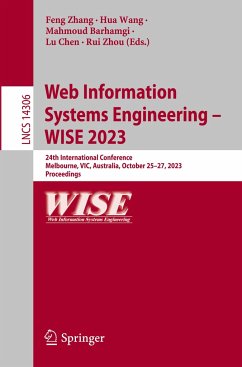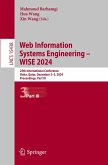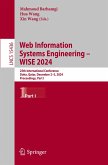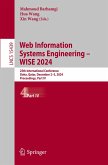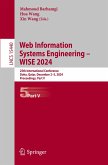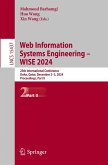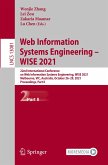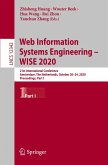Web Information Systems Engineering ¿ WISE 2023
24th International Conference, Melbourne, VIC, Australia, October 25¿27, 2023, Proceedings
Herausgegeben:Zhang, Feng; Wang, Hua; Barhamgi, Mahmoud; Chen, Lu; Zhou, Rui
Web Information Systems Engineering ¿ WISE 2023
24th International Conference, Melbourne, VIC, Australia, October 25¿27, 2023, Proceedings
Herausgegeben:Zhang, Feng; Wang, Hua; Barhamgi, Mahmoud; Chen, Lu; Zhou, Rui
- Broschiertes Buch
- Merkliste
- Auf die Merkliste
- Bewerten Bewerten
- Teilen
- Produkt teilen
- Produkterinnerung
- Produkterinnerung
This book constitutes the proceedings of the 24th International Conference on Web Information Systems Engineering, WISE 2023, held in Melbourne, Victoria, Australia, in October 2023. The 33 full and 40 short papers were carefully reviewed and selected from 137 submissions. They were organized in topical sections as follows: text and sentiment analysis; question answering and information retrieval; social media and news analysis; security and privacy; web technologies; graph embeddings and link predictions; predictive analysis and machine learning; recommendation systems; natural language…mehr
Andere Kunden interessierten sich auch für
![Web Information Systems Engineering - WISE 2024 Web Information Systems Engineering - WISE 2024]() Web Information Systems Engineering - WISE 202460,99 €
Web Information Systems Engineering - WISE 202460,99 €![Web Information Systems Engineering - WISE 2024 Web Information Systems Engineering - WISE 2024]() Web Information Systems Engineering - WISE 202462,99 €
Web Information Systems Engineering - WISE 202462,99 €![Web Information Systems Engineering - WISE 2024 Web Information Systems Engineering - WISE 2024]() Web Information Systems Engineering - WISE 202462,99 €
Web Information Systems Engineering - WISE 202462,99 €![Web Information Systems Engineering - WISE 2024 Web Information Systems Engineering - WISE 2024]() Web Information Systems Engineering - WISE 202462,99 €
Web Information Systems Engineering - WISE 202462,99 €![Web Information Systems Engineering - WISE 2024 Web Information Systems Engineering - WISE 2024]() Web Information Systems Engineering - WISE 202460,99 €
Web Information Systems Engineering - WISE 202460,99 €![Web Information Systems Engineering - WISE 2021 Web Information Systems Engineering - WISE 2021]() Web Information Systems Engineering - WISE 202197,99 €
Web Information Systems Engineering - WISE 202197,99 €![Web Information Systems Engineering - WISE 2020 Web Information Systems Engineering - WISE 2020]() Web Information Systems Engineering - WISE 202041,99 €
Web Information Systems Engineering - WISE 202041,99 €-
-
-
This book constitutes the proceedings of the 24th International Conference on Web Information Systems Engineering, WISE 2023, held in Melbourne, Victoria, Australia, in October 2023.
The 33 full and 40 short papers were carefully reviewed and selected from 137 submissions. They were organized in topical sections as follows: text and sentiment analysis; question answering and information retrieval; social media and news analysis; security and privacy; web technologies; graph embeddings and link predictions; predictive analysis and machine learning; recommendation systems; natural language processing (NLP) and databases; data analysis and optimization; anomaly and threat detection; streaming data; miscellaneous; explainability and scalability in AI.
The 33 full and 40 short papers were carefully reviewed and selected from 137 submissions. They were organized in topical sections as follows: text and sentiment analysis; question answering and information retrieval; social media and news analysis; security and privacy; web technologies; graph embeddings and link predictions; predictive analysis and machine learning; recommendation systems; natural language processing (NLP) and databases; data analysis and optimization; anomaly and threat detection; streaming data; miscellaneous; explainability and scalability in AI.
Produktdetails
- Produktdetails
- Lecture Notes in Computer Science 14306
- Verlag: Springer / Springer Nature Singapore / Springer, Berlin
- Artikelnr. des Verlages: 978-981-99-7253-1
- 1st ed. 2023
- Seitenzahl: 976
- Erscheinungstermin: 22. Oktober 2023
- Englisch
- Abmessung: 235mm x 155mm x 52mm
- Gewicht: 1445g
- ISBN-13: 9789819972531
- ISBN-10: 9819972531
- Artikelnr.: 68881981
- Herstellerkennzeichnung Die Herstellerinformationen sind derzeit nicht verfügbar.
- Lecture Notes in Computer Science 14306
- Verlag: Springer / Springer Nature Singapore / Springer, Berlin
- Artikelnr. des Verlages: 978-981-99-7253-1
- 1st ed. 2023
- Seitenzahl: 976
- Erscheinungstermin: 22. Oktober 2023
- Englisch
- Abmessung: 235mm x 155mm x 52mm
- Gewicht: 1445g
- ISBN-13: 9789819972531
- ISBN-10: 9819972531
- Artikelnr.: 68881981
- Herstellerkennzeichnung Die Herstellerinformationen sind derzeit nicht verfügbar.
Text and Sentiment Analysis.- Ensemble Learning Model for Medical Text Classification.- Fuzzy Based Text Quality Assessment for Sentiment Analysis.- Prompt-Learning for Semi-Supervised Text Classification.- Label-Dependent Hypergraph Neural Network for Enhanced Multi-label Text Classification.- Fast Text Comparison Based on ElasticSearch and Dynamic Programming.- Question Answering and Information Retrieval.- User Context-aware Attention Networks for Answer Selection.- Towards Robust Token Embeddings for Extractive Question Answering.- Math Information Retrieval with Contrastive Learning of Formula Embeddings.- Social Media and News Analysis.- Influence Embedding from Incomplete Observations in Sina Weibo.- Dissemination of Fact-checked News does not Combat False News: Empirical Analysis.- Highly Applicable Linear Event Detection Algorithm on Social Media with Graph Stream.- Leveraging Social Networks for Mergers and Acquisitions Forecasting.- Enhancing Trust Prediction in Attributed Social Networks with Self-Supervised Learning.- Security and Privacy.- Bilateral Insider Threat Detection: Harnessing Standalone and Sequential Activities with Recurrent Neural Networks.- ATDG: An Automatic Cyber Threat Intelligence Extraction Model of DPCNN and BIGRU Combined with Attention Mechanism.- Blockchain-Empowered Resource Allocation and Data Security for Efficient Vehicle Edge Computing.- Priv-S: Privacy-Sensitive Data Identification in Online Social Networks.- TLEF: Two-Layer Evolutionary Framework for t-closeness Anonymization.- A Dual-Layer Privacy-Preserving Federated Learning Framework.- A Privacy-Preserving Evolutionary Computation Framework for Feature Selection.- Local Difference-based Federated Learning Against Preference Profiling Attacks.- Proximity-based MAENS: A Computational Intelligence Method for Privacy-Preserving Multiple Traveling Salesmen Problem.- Empowering Vulnerability Prioritization: A Heterogeneous Graph-Driven Framework for Exploitability Prediction.- ICAD: An Intelligent Framework for Real-Time Criminal Analytics and Detection.- Web Technologies.- Web Page Segmentation: A DOM-structural Cohesion Analysis Approach.- Learning to Select the Relevant History Turns in Conversational Question Answering.- A Methodological Approach for Data-intensive Web Application Design on top of Data Lakes.- ESPRESSO: A Framework for Empowering Search on Decentralized Web.- Primary Building Blocks for Web Automation.- A Web Service Oriented Integration Solution for Capital Facilities Information Handover.- Deep Neural Network based approach for IoT service QoS prediction.- Graph Embeddings and Link Predictions.- Path-KGE: Preference-aware Knowledge Graph Embedding with Path Semantics for Link Prediction.- Efficient Graph Embedding Method for Link Prediction via Incorporating Graph Structure and Node Attributes.- Link Prediction for Opportunistic Networks Based on Hybrid Similarity Metrics and E-LSTM-D Models.- FastAGEDs: Fast Approximate Graph Entity Dependency Discovery.- Topological Network Field Preservation For Heterogeneous Graph Embedding.- Predictive Analysis and Machine Learning.- Federated Learning Performance on Early ICU Mortality Prediction with Extreme Data Distributions.- TSEGformer:Time-Space dimension dependency transformer for use in multivariate time series prediction.- Fraudulent Jobs Prediction Using Natural Language Processing and Deep Learning Sequential Models.- Prediction of Student Performance with Machine Learning Algorithms Based on ensemble learning methods.- Recommendation Systems.- Counterfactual Explanations for Sequential Recommendation with Temporal Dependencies.- Incorporating Social-aware User Preference for Video Recommendation.- Noise-augmented Contrastive Learning for Sequential Recommendation.- Self-Attention Convolutional Neural Network for Sequential Recommendation.- Informative Anchor-enhanced Heterogeneous Global Graph Neural Networks for Personalized Session-based Recommendation.- Leveraging Sequential Episode Mining for Session-based News Recommendation.- Improving Conversational Recommender Systems via Knowledge enhanced Temporal Embedding.- Natural Language Processing (NLP) and Databases .- Multi-level Correlation Matching for Legal Text Similarity Modeling with Multiple Examples.- GAN-IE: Enhancing Information Extraction Through Generative Adversarial Networks with Limited Annotated Data.- An Integrated Interactive Framework for Natural Language to SQL Translation.- Task-driven Neural Natural Language Interface to Database.- Identification and Generation of Actions using Pre-trained Language Models.- GADESQL: Graph Attention Diffusion Enhanced Text-To-SQL with Single and Multi-hop Relations.- An Ensemble-based Approach for Generative Language Model Attribution.- Knowledge-grounded Dialogue Generation with Contrastive Knowledge Selection.- Data Analysis and Optimization.- A data-driven Approach to Finding K for K Nearest Neighbor Matching in Average Causal Effect Estimation.- Processing Reverse Nearest Neighbor Queries Based on Unbalanced Multiway Region Tree Index.- Solving Injection Molding Production Cost Problem Based on Combined Group Role Assignment with Costs.- CREAM: Named Entity Recognition with Concise Query and Region-Aware Minimization.- Anomaly and Threat Detection.- An Effective Dynamic Cost-Sensitive Weighting based Anomaly Multi-Classification Model for Imbalanced Multivariate Time Series.- Multivariate Time Series Anomaly Detection Based on Graph Neural Network for Big Data Scheduling System.- Study on Credit Risk Control By Variational Inference.- Streaming Data.- An Adaptive Drilling Sampling Method and Evaluation Model for Large Scale Streaming Data.- Unsupervised Representation Learning with Semantic of Streaming Time Series.- Miscellaneous.- Capo: Calibrating Device-to-Device Positioning With a Collaborative Network.- The Impact on Employability by COVID-19 Pandemic - AI case studies.- A semi-automatic framework towards building Electricity Grid Infrastructure Management ontology: A case study and retrospective.- Word-Graph2vec: An efficient word embedding approach on word co-occurrence graph using random walk technique.- Meta-Learning for Estimating Multiple Treatment Effects with Imbalance.- SML: Semantic Machine Learning Model Ontology.- Explainability and Scalability in AI.- A Comprehensive Survey of Explainable Artificial Intelligence (XAI) Methods: Exploring Transparency and Interpretability.- Scaling Machine Learning with an efficient Hybrid Distributed Framework.- Domain Adaptation with Sample Relation Reinforcement.
Text and Sentiment Analysis.- Ensemble Learning Model for Medical Text Classification.- Fuzzy Based Text Quality Assessment for Sentiment Analysis.- Prompt-Learning for Semi-Supervised Text Classification.- Label-Dependent Hypergraph Neural Network for Enhanced Multi-label Text Classification.- Fast Text Comparison Based on ElasticSearch and Dynamic Programming.- Question Answering and Information Retrieval.- User Context-aware Attention Networks for Answer Selection.- Towards Robust Token Embeddings for Extractive Question Answering.- Math Information Retrieval with Contrastive Learning of Formula Embeddings.- Social Media and News Analysis.- Influence Embedding from Incomplete Observations in Sina Weibo.- Dissemination of Fact-checked News does not Combat False News: Empirical Analysis.- Highly Applicable Linear Event Detection Algorithm on Social Media with Graph Stream.- Leveraging Social Networks for Mergers and Acquisitions Forecasting.- Enhancing Trust Prediction in Attributed Social Networks with Self-Supervised Learning.- Security and Privacy.- Bilateral Insider Threat Detection: Harnessing Standalone and Sequential Activities with Recurrent Neural Networks.- ATDG: An Automatic Cyber Threat Intelligence Extraction Model of DPCNN and BIGRU Combined with Attention Mechanism.- Blockchain-Empowered Resource Allocation and Data Security for Efficient Vehicle Edge Computing.- Priv-S: Privacy-Sensitive Data Identification in Online Social Networks.- TLEF: Two-Layer Evolutionary Framework for t-closeness Anonymization.- A Dual-Layer Privacy-Preserving Federated Learning Framework.- A Privacy-Preserving Evolutionary Computation Framework for Feature Selection.- Local Difference-based Federated Learning Against Preference Profiling Attacks.- Proximity-based MAENS: A Computational Intelligence Method for Privacy-Preserving Multiple Traveling Salesmen Problem.- Empowering Vulnerability Prioritization: A Heterogeneous Graph-Driven Framework for Exploitability Prediction.- ICAD: An Intelligent Framework for Real-Time Criminal Analytics and Detection.- Web Technologies.- Web Page Segmentation: A DOM-structural Cohesion Analysis Approach.- Learning to Select the Relevant History Turns in Conversational Question Answering.- A Methodological Approach for Data-intensive Web Application Design on top of Data Lakes.- ESPRESSO: A Framework for Empowering Search on Decentralized Web.- Primary Building Blocks for Web Automation.- A Web Service Oriented Integration Solution for Capital Facilities Information Handover.- Deep Neural Network based approach for IoT service QoS prediction.- Graph Embeddings and Link Predictions.- Path-KGE: Preference-aware Knowledge Graph Embedding with Path Semantics for Link Prediction.- Efficient Graph Embedding Method for Link Prediction via Incorporating Graph Structure and Node Attributes.- Link Prediction for Opportunistic Networks Based on Hybrid Similarity Metrics and E-LSTM-D Models.- FastAGEDs: Fast Approximate Graph Entity Dependency Discovery.- Topological Network Field Preservation For Heterogeneous Graph Embedding.- Predictive Analysis and Machine Learning.- Federated Learning Performance on Early ICU Mortality Prediction with Extreme Data Distributions.- TSEGformer:Time-Space dimension dependency transformer for use in multivariate time series prediction.- Fraudulent Jobs Prediction Using Natural Language Processing and Deep Learning Sequential Models.- Prediction of Student Performance with Machine Learning Algorithms Based on ensemble learning methods.- Recommendation Systems.- Counterfactual Explanations for Sequential Recommendation with Temporal Dependencies.- Incorporating Social-aware User Preference for Video Recommendation.- Noise-augmented Contrastive Learning for Sequential Recommendation.- Self-Attention Convolutional Neural Network for Sequential Recommendation.- Informative Anchor-enhanced Heterogeneous Global Graph Neural Networks for Personalized Session-based Recommendation.- Leveraging Sequential Episode Mining for Session-based News Recommendation.- Improving Conversational Recommender Systems via Knowledge enhanced Temporal Embedding.- Natural Language Processing (NLP) and Databases .- Multi-level Correlation Matching for Legal Text Similarity Modeling with Multiple Examples.- GAN-IE: Enhancing Information Extraction Through Generative Adversarial Networks with Limited Annotated Data.- An Integrated Interactive Framework for Natural Language to SQL Translation.- Task-driven Neural Natural Language Interface to Database.- Identification and Generation of Actions using Pre-trained Language Models.- GADESQL: Graph Attention Diffusion Enhanced Text-To-SQL with Single and Multi-hop Relations.- An Ensemble-based Approach for Generative Language Model Attribution.- Knowledge-grounded Dialogue Generation with Contrastive Knowledge Selection.- Data Analysis and Optimization.- A data-driven Approach to Finding K for K Nearest Neighbor Matching in Average Causal Effect Estimation.- Processing Reverse Nearest Neighbor Queries Based on Unbalanced Multiway Region Tree Index.- Solving Injection Molding Production Cost Problem Based on Combined Group Role Assignment with Costs.- CREAM: Named Entity Recognition with Concise Query and Region-Aware Minimization.- Anomaly and Threat Detection.- An Effective Dynamic Cost-Sensitive Weighting based Anomaly Multi-Classification Model for Imbalanced Multivariate Time Series.- Multivariate Time Series Anomaly Detection Based on Graph Neural Network for Big Data Scheduling System.- Study on Credit Risk Control By Variational Inference.- Streaming Data.- An Adaptive Drilling Sampling Method and Evaluation Model for Large Scale Streaming Data.- Unsupervised Representation Learning with Semantic of Streaming Time Series.- Miscellaneous.- Capo: Calibrating Device-to-Device Positioning With a Collaborative Network.- The Impact on Employability by COVID-19 Pandemic - AI case studies.- A semi-automatic framework towards building Electricity Grid Infrastructure Management ontology: A case study and retrospective.- Word-Graph2vec: An efficient word embedding approach on word co-occurrence graph using random walk technique.- Meta-Learning for Estimating Multiple Treatment Effects with Imbalance.- SML: Semantic Machine Learning Model Ontology.- Explainability and Scalability in AI.- A Comprehensive Survey of Explainable Artificial Intelligence (XAI) Methods: Exploring Transparency and Interpretability.- Scaling Machine Learning with an efficient Hybrid Distributed Framework.- Domain Adaptation with Sample Relation Reinforcement.

